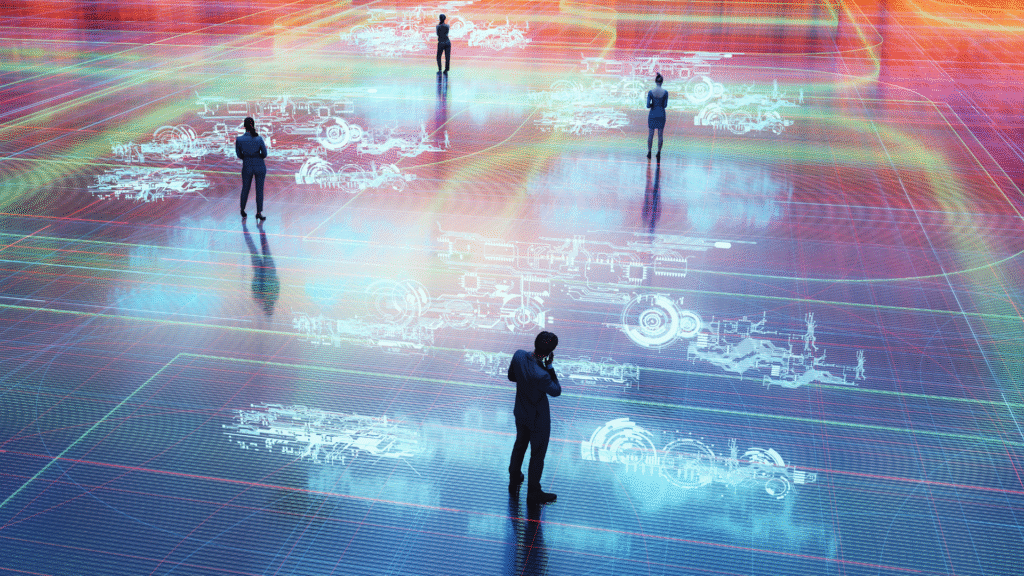

Simona Lipstaite
Public Affairs


On 25 April 2023, Access Partnership and Metaverse Insider co-hosted a virtual roundtable on ‘The Industrial Metaverse: How do we foster innovation?’. Moderated by our Head of Europe, Simona Lipstaite, the event brought together four leading thinkers from across the tech world to explore the challenges facing industrial deployment of metaverse-related technologies:
Alex Challans, CEO of Metaverse Insider’s parent company, Resonance, began proceedings by providing a contextual overview of the state of the metaverse and its position in the wider tech market, especially compared to AI. Despite the negativity surrounding the metaverse in the general media discourse, Alex argued that investment trends highlight the depth of interest in the metaverse as a concept with various industrial use cases.
In a presentation on Nokia’s path to enabling the industrial metaverse, Dr Volker Ziegler stressed that the industrial metaverse represented a combination of digital-physical fusion, such as digital twins, and human augmentation, comprising extended reality interoperability. He also described how the growth of the metaverse will go hand-in-hand with the development of enabling technologies like 6G and blockchain. Dr Ziegler added that current projections suggest that the industrial metaverse has better financial potential than consumer applications.
Simon Bennet described the industrial metaverse as a collaboration layer on top of a digital twin, enabling people to interact with all of the information provided by their digital twin. Rather than focusing on the interface, Simon said deployment revolved around gaining access to real-time operations and engineering data streams.
Greg Demchak emphasised the practicality of the industrial metaverse as a way to extend customer value and bring investment to the next level. Matthieu Worm, meanwhile, said that the true value of an industrial metaverse will appear when we are able to create a seamless transition along the product lifecycle, from design and engineering to manufacturing and usage.
When it came to highlighting the main obstacles to rolling out the industrial metaverse, Matthieu identified the SaaS transition, APIs and accessibility of data sources, and interoperability. Building on the SaaS point, Greg argued that it was hard to envisage a metaverse without 3D interaction, which for Bentley Systems required a complete rethinking of how to deliver 3D geometry to end-user experiences. He said this mental shift from working with 3D files to making an API connection is a technical problem that needs solving before you can deliver a smooth user experience.
Simon added a couple of extra points to those above, highlighting customer preparedness for digital twins as a time inhibitor. Various human and investment cases as required to put together strong digitalisation strategies, he said, before we can start to think about an industrial metaverse. Simon also stressed the noise from the market as diluting the industrial metaverse’s potential by grouping it with the wider metaverse concept. Volker jumped on this idea of ‘noise’ to stress the opportunity to link value chains in an industrial context and create multi-party ecosystems.
The conversation then moved on to standards and their likely timeframes. Simon said companies need to run in parallel to standards bodies, adhering to standards when they emerge while expecting organisations to move at pace to take advantage of opportunities. Matthieu said many existing standards are applicable to the industrial metaverse and there is no time to wait for new standards. He argued that standardisation is not the core topic of interoperability.
Greg agreed with this statement, stating that the key was APIs and the ability to communicate to perform necessary transformations from a single source. As long as there is an openness between platforms, he argued that we don’t need to wait to move from one set of standards to another. While Volker conceded the importance of openness, he said standards are required to ensure a basic level of interoperability. Top-down standards would be a mistake though, he said, emphasising the importance of industry-led standards. He added that the relationship between standards regimes and patent regimes shouldn’t be overlooked as a means to recapture investment value.
In terms of what policymakers can do to foster innovation and adoption, Volker stressed the importance of the public and private sectors working together for the mutual benefit of society and industry.
Greg highlighted the intersection of AI and large language models with the metaverse and digital twins as where policymaking becomes interesting. Approaching the subject from an infrastructure perspective, he pondered the security implications of allowing AI to access all this data.
Simon said public investment is key to acceleration, with industrialisation and industrial automation two domains where Europe currently retains a global lead. Simon said a good test of resilience was whether we have policies in place for how we use tools like Zoom and Microsoft Teams. Given our acceptance of these forums, he argued at many cyber protection techniques are already in place to be reused in the metaverse.
Having long focused on the physics-based element of digital twins, Matthieu said they are now very much a data-driven exercise. Volker agreed, emphasising how much this is tied to predictive analytics that go beyond the physical, bringing this back to policymaking to avoid harmful scenarios.
Simon said digital twins are the foundation of anything in the industrial metaverse as without this it is just a game. Greg said he was seeing the increased development of technology that is expanding the reality capture that can be used in the real world, such as in photography or videography. Matthieu said the key element that simulation brings is the future perspective, using historical data to validate models that drive future decision-making.
To close the conversation, the discussion moved to skills and the talent required to make the metaverse happen. Volker said that there is a generation gap in terms of value scenarios on issues like net zero, which skills training can help to overcome. Simon said that the AI world requires data science skills to get off the ground and that the industrial metaverse will benefit from a surplus of skills because people are now 3D natives. Accurate data will be the key to achieving goals like net zero, he said.
During the session Metaverse Insider gave a sneak peek of their upcoming Metaverse Insider Intelligence platform. This new platform aims to provide comprehensive market data on the metaverse industry, catering to the needs of individuals and organisations alike.
Watch the recorded session below.

